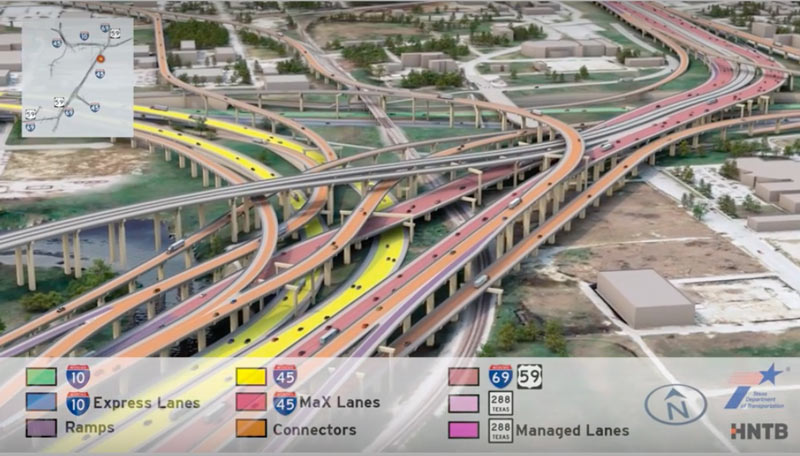I mostly missed this when it happened.
The Federal Highway Administration has asked Texas’ transportation department to halt construction on an Interstate 45 expansion project, citing civil rights concerns.
The news comes the same day Harris County announced it was suing the Texas Department of Transportation over the North Houston Highway Improvement Project.
In its letter to TxDOT, the FHWA said it was acting in response to public input on the state’s project — which would widen I-45 in three segments from downtown Houston to Beltway 8 — raising concerns under Title VI of the Civil Rights Act of 1964, as well as environmental justice concerns.
The federal agency said it alone was responsible for such civil rights complaints, and asked for time to review them.
“To allow FHWA to evaluate the serious Title VI concerns raised…we request that TxDot pause before initiating further contract solicitation efforts for the project, including issuance of any Requests for Proposals, until FHWA has completed its review and determined whether any further actions may be necessary to address those concerns,” the March 8 letter reads.
The agency added that it would “expedite its efforts to resolve any issues as quickly as possible.”
As noted, that happened the same day that Harris County filed a lawsuit to force a redo of the existing environmental review of the project. I mentioned it in an update but hadn’t seen any stories about the FHWA action, so didn’t give it much thought. More recently, I read this Observer story, which goes into more detail about the federal intervention.
FHWA’s intervention in Houston is perhaps the first sign of a significant sea change in the U.S. Department of Transportation under Secretary Pete Buttigieg. Shortly after the former South Bend, Indiana, mayor was nominated to the cabinet position, he told CNN, “It’s disproportionately Black and brown neighborhoods that were divided by highway projects plowing through them because they didn’t have the political capital to resist. We have a chance to get that right.”
Houston is a test case for that commitment. Over the coming months, FHWA investigators plan to talk to community members, local officials, and advocates to determine, among other things, whether the highway expansion project “creates potential disparate, adverse impacts to the predominantly African American and Hispanic communities within the project area.” If the agency finds that discrimination occurred, it can refer the project to the U.S. Department of Justice to litigate or withhold some categories of funding allocated to Texas. More likely, the FHWA will try to mediate some kind of voluntary resolution with TxDOT.
“I think the really important thing is that it’s about whether there’s a disparate impact,” says Erin Gaines, an attorney at Earthjustice who has worked on Title VI complaints. “They may also be talking about intentional discrimination, but you don’t need intentional discrimination to violate Title VI in an administrative complaint. You need a disparate impact.” In other words, it doesn’t matter if TxDOT intentionally chose to expand a highway that runs through a predominately Black and Hispanic neighborhood; it only matters if Black and Hispanic people are unequally impacted by the highway being expanded.
“Many of these neighborhoods literally had no voice in the construction of this highway,” says Christof Spieler, the director of planning at the design firm Huitt-Zollars. When I-45 was completed in 1958, many “residents were not even able to vote for the government that was putting these projects in place.”
By the time the Voting Rights Act passed in 1965, most urban highways across the United States had already been planned and built.
[…]
The FHWA is beginning the process of interviewing impacted residents and may conduct site visits this summer, but it’s still unclear what residents will be able to demand and what outcomes TxDOT will entertain.
The investigation could prompt TxDOT to reconsider how it approaches highway projects in cities across the state—the agency has just begun the NEPA process for a $7.5 billion expansion of I-35 through Austin. But ultimately, change will have to come from the state legislature, which has required that 97 percent of TxDOT’s funding be spent on roads.
It always comes down to winning more elections, doesn’t it? I have no idea what to expect from the FHWA here. Could be a game-changer (and if it is, I 100% expect a lawsuit from the state over it), could be mostly cosmetic. At least it’s something. For more, give a listen to Tuesday’s What Next podcast, in which Houston activists Tomaro Bell and Oni Blair are interviewed; a transcript of the latter is here. The Chron editorial board has more.


Let’s just do that 610/Beltway 8 bypass.
This is what y’all voted for. Build back better? Not in Houston, apparently. Ironic, since both Houston and Harris County went for Biden. This is how Biden says “Thanks, y’all.”
Shut up Bill
Bill is a paid troll for one of the racist organizations or paid for Russian or Iran.